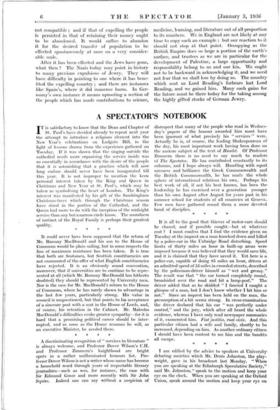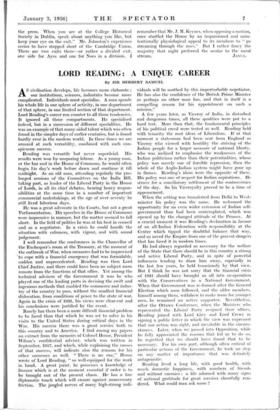A SPECTATOR'S NOTEBOOK
IT is satisfactory to know that the Dean and Chapter of St. Paul's have decided already to repeat next year the attempt to introduce a religious element into the New Year's celebrations on Ludgate Hill, in the light of lessons drawn from the experience gathered on Tuesday. If it was shown that the singing outside the cathedral needs more organising the service inside was so essentially in accordance with the desire of the people that it is astonishing that a practice which will now long endure should never have been inaugurated till this year. It is not improper to mention the keen personal interest taken by the King and Queen in Christmas and New Year at St. Paul's, which may be taken as symbolising the heart of London. The King's interest was manifested by his gift of the Sandringham Christmas-trees which through the Christmas season have stood in the portico of the Cathedral, and the Queen had more to do with the inception of the midnight service than any but a narrow circle know. The soundness of instinct of the Royal Family is perhaps their greatest quality.
It could never have been supposed that the return of Mr. Ramsay MacDonald and his son to the House of Commons would be plain sailing, but in some respects the line of maximum resistance has been taken. It is true that both are Scotsmen, but Scottish constituencies are not enamoured of the offer of what English constituencies have rejected. It is an obviously sound convention, moreover, that if universities are to continue to be repre- sented at all (which Mr. Ramsay MacDonald has hitherto doubted) they should be represented by University men. Nor is the case for Mr. MacDonald's return to the House of Commons, where he has rarely shown to advantage in the last few years, particularly strong. His value in council is unquestioned, but that points to his acceptance of a sinecure post with a seat in the House of Lords, and, of course, his retention in the Cabinet. Mr. Malcolm MacDonald's difficulties evoke greater sympathy—for it is hard that a promising political career should be inter- rupted, and as soon as the House resumes he will, as an executive Minister, be needed there.
A discriminating recognition of" services to literature" is always welcome, and Professor Dover Wilson's C.H. and Professor Zimmem's knighthood are bright spots in a rather unilluminated honours list. Pro- fessor Dover Wilson is not a writer whose name has become a household word through years of respectable literary journalism—such as was, for instance, the case with Sir Edmund -Gosse and more recently with Sir John Squire. Indeed one can say without a suspicion of disrespect that many of the people who read in Wednes- day's papers of the honour awarded him must have been ignorant of what precisely his " services " were. Actually he is, of course, the leading Shakespearean of the day, his most important work having been done on the austere subject of the text of Hamlet. Of Professor Zimmern there is no need to say much to readers of The Spectator. He has contributed constantly to its columns, and I hope always will. Handling with equal sureness and brilliance the Greek Commonwealth and the British Commonwealth, he has made the whole sphere of international relations his own. Perhaps his best work of all, if not his best known, has been the leadership he has exercised over a generation younger than his own August after August for years past in his summer school for students of all countries at Geneva. Few men have gathered round them a more devoted band of disciplies.
It is all to the good that thieves of motor-cars should be chased, and if possible caught—but at whatever cost ? I must confess that I find the evidence given on Tuesday at the inquest on a man knocked down and killed by a police-car in the Uxbridge Road disturbing. Speed limits of thirty miles an hour in built-up areas were imposed because it was believed that they would save life, and it is claimed that they have saved it. Yet here is a police-car, capable of doing 85 miles an hour, driven at an admitted speed of 55 miles in crowded streets, described by the policeman-driver himself as "wet and greasy." The result was that "the car turned completely round, broadsided over the road and hit a lamp-post." The driver added that as he skidded "I fancied I caught a glimpse of a man, but I don't know whether I hit him or not." Since an inquest has been held on the man, the presumption of a hit seems strong. In cross-examination the driver declared that his car "was perfectly under control," and the jury, which after all heard the whole evidence, whereas I have only read newspaper summaries of it, exonerated him. Fiat justitia, ruat civis. And this particular citizen had a wife and family, shortly to be increased, depending on him. As another ordinary citizen I should have been content to see him and the bandits all escape.
I am edified by the advice to speakers at University debating societies which Mr. Denis Johnston, the play- wright, gave in his broadcast last Monday. "When you are speaking at the Edinburgh Speculative Society," said Mr. Johnston," speak to the motion and keep your eye on the clock. When you are speaking at the Oxford Union, speak around the motion and keep your eye on the press. When you are at the College Historical Society in Dublin, speak about anything 'you like, but keep your eye on the exit." Mr. Johnston's experience seems to have stopped short of the Cambridge Union. There are two exits there—or rather a divided exit, one side for Ayes and one for Noes in a division. I remember that Mr. J. M. Keynes, when opposing a motion, once startled the House by an impassioned and unin- tentionally physiological appeal to its members to "go streaming through the noes." But I rather fancy the majority that night preferred the ocular to the nasal











































 Previous page
Previous page